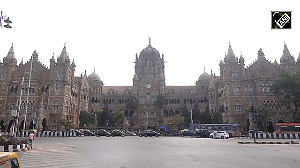The United States-led war on Iraq is certain to hurt India's economic interests. Higher prices of crude oil and petroleum products would stoke inflationary fires. Civil aviation, shipping, tourism, inward remittances and exports are also going to be affected.
That the war would have an adverse impact on India is beyond doubt. What is not clear is the precise extent of the impact.
A lot depends on the levels at which international crude oil prices stabilize in the coming months. If world crude prices hover around $30 a barrel, the inflation rate in India would rise from around 6 per cent at present to around 7.5 per cent.
If, on the other hand, crude prices rise to $40 a barrel and remain at that level for a few months, do not be surprised if the inflation rate as measured by the wholesale price index touches the double-digit mark during the financial year.
That would, of course, be bad news for the Vajpayee government since elections to a number of assemblies will be taking place later this year and general elections are scheduled for next year.
There are two important reasons why the Indian economy has become increasingly vulnerable to fluctuations in the international prices of crude oil.
The first reason -- and the more important one -- is the country's growing dependence on oil imports in recent years and the second reason is the dismantling of the administered pricing mechanism for petroleum products.
When the first Gulf War broke out in January 1991 after the Saddam Hussein regime invaded Kuwait, India was cushioned from the full impact of the surge in world oil prices simply because the country imported less than one-third of its requirements of crude oil and petroleum products.
Production from Bombay High had just about peaked at that juncture and the rise in the domestic demand for petroleum products was not outstripping the growth in indigenous output of crude oil.
Over the next 12 years or thereabouts, the situation slowly reversed and India started becoming increasingly dependent on imported crude.
During 2002-03, an estimated 73 per cent of the total value of crude oil consumed in the country was imported and this proportion could rise to three-fourths during the current fiscal year.
Since April 1, 2002, the Union government has begun dismantling the administered pricing mechanism for all petroleum products and started reducing the subsidies on particular products like kerosene and cooking gas.
Though the ministry of petroleum and natural gas still wields considerable influence on the prices charged by 'autonomous' petroleum refining and marketing companies, the fact of the matter is that domestic prices have become -- and will continue to be -- more and more closely linked with world prices.
In the last three months, the prices of motor spirit and diesel have gone up by around 10 per cent.
In particular, the rise in diesel rates has a direct impact on the overall rate of inflation since it raises transport costs and thus, increases the prices of a very wide range of commodities.
Once transport costs go up, traders and intermediaries are emboldened to increase wholesale and retail prices by disproportionately higher margins in an economic environment in which 'psychological' expectations of a higher inflation rate dominate.
Look at how the annual inflation rate has gone up over the last year. Till the end of May 2002, the rise in the wholesale price index was less than 2 per cent.
The index rose subsequently on account of the drought and by the end of the year had exceeded the 3 per cent mark.
Thereafter, the rise in the WPI has been largely a consequence of higher fuel prices and, as already stated, currently exceeds 5.6 per cent, the highest over the past year and a half.
On March 18, the president of the Federation of Indian Chambers of Commerce and Industry A C Muthiah predicted that even a short-duration war could see domestic oil prices going up by 9 per cent during 2003-04.
He added that the Rs 8,116 crore (Rs 81.16 billion) subsidy for petroleum products earmarked in the current year's budget would prove to be inadequate.
Since the government would certainly like oil companies not to pass the entire burden of higher prices of imported crude on to the consumer in a pre-election year, the budgeted amount earmarked for subsidising petroleum products would surely be exceeded -- thereby adding to the fiscal deficit.
Just before the war began, on March 17, the Confederation of Indian Industry observed: "A short successful US campaign could actually be beneficial if oil prices decline as geopolitical uncertainties are eliminated. However, a prolonged war and the rise in terrorist activity that is likely to follow could affect the stability of the economy "
During the first three days of the war, world oil prices came down to four-month lows after hitting a 12-year high of over $37 a barrel in the first week of March.
As it became increasingly evident that the war would not be short, swift or surgically precise, oil prices started moving up.
When CNN and BBC started saying the fall of Baghdad is imminent, once again oil prices eased. If, however, the war in Iraq's capital proves messy and prolonged, it is certain oil prices would again rise.
Given this volatility, one cannot say for sure at what level world oil prices would stabilize.
The CII has calculated that if the average price of a barrel of imported crude oil during 2003-04 is $30, the inflation rate in the country would rise by only one per cent over last year's level.
If, on the other hand, the average price of imported crude rises to $36 a barrel, India's annual rate of inflation could rise by over 3.5 per cent over last year's level and hit the 7.5 per cent mark.
Current indications are that the second scenario may be a more realistic one.
The approximate average prices of imported crude oil and the value of India's total oil imports in recent year are given below:
|
Year (ending March) |
Average price of imported crude oil (in $ per barrel) |
India's total oil imports (in $ billion) |
|
1998-99 |
12 |
6.4 |
|
1999-2000 |
21 |
12.6 |
|
2000-01 |
28 |
15.6 |
|
2001-02 |
23 |
14 |
|
2002-03 |
28 |
16 |
It should be noted that over the last three years, the country's total oil import bill has not gone up significantly.
An important reason why this has happened is that over the last two years, diesel demand has been rather depressed and has actually come down marginally -- on account of recessionary conditions prevailing in certain segments of the economy.
The government has been tom-tomming the fact that the country possesses foreign currency reserves in the region of $75 billion, the highest-ever.
In other words, no problems are envisaged in paying for more costly oil imports (which, incidentally, account for more than one-fourth of India's total imports).
Petroleum Minister Ram Naik has been repeatedly stating that no shortages are expected since oil companies keep surplus stocks equal to two months' consumption requirements.
The problems are, however, of a completely different nature -- these relate to prices not availability.
Whereas over the last two years, India has imported barely 5 per cent of the country's total oil imports from Iraq, the Persian Gulf remains an important location for imports even if the purchases are made from Russia or far-away Venezuela.
Experts estimate that around two-thirds of India's total oil imports come from the Middle East, simply because of reasons of geographical proximity.
One can only hope that the fallout of the war on Iraq would not be a major disruption of the movement of vessels (including oil tankers) on the Arabian Sea.
Higher prices of petroleum products would naturally increase costs of production for the manufacturing sector (including costs of transportation and captive generation of power) that, in turn, would thwart the expected industrial recovery.
As the Confederation of Indian Industry has pointed out, profits of the corporate sector would be squeezed by higher fuel costs and insurance risk premia would rise.
If the American economy slows down -- as many observers expected it to -- India's buoyant exports could be hit, especially exports of computer software and info-tech personnel.
Then, of course, India's direct exports to Iraq (not excluding alphonso mangoes) worth a few hundred million US dollars would come down drastically.
Till 1982, before the eight-year-long Iran-Iraq war started, Indian construction companies were involved in building more than 50 projects in Iraq worth around Rs 2,500 crore (Rs 25 billion).
While it has been claimed that Indian companies could play a role in the reconstruction of post-war Iraq, it is too early to predict what would transpire.
In the short-run, the adverse impact of the war would be felt on the civil aviation sector as well as the hotels and tourism industries.
Last but not the least, the war on Iraq may make the Middle East an unsafe place for Indian workers.
There are an estimated 3.8 million Indians living in this part of the world. The biggest section is from Kerala and many of them are engaged in construction activities or in professions like nursing.
These Indians remit between $6 billion and $7 billion each year. An unstable Persian Gulf may eventually lead to a slackening of this flow of remittances.
One hates to sound like a prophet of doom. But the reality on the ground does not leave much room for optimism.







 © 2025
© 2025